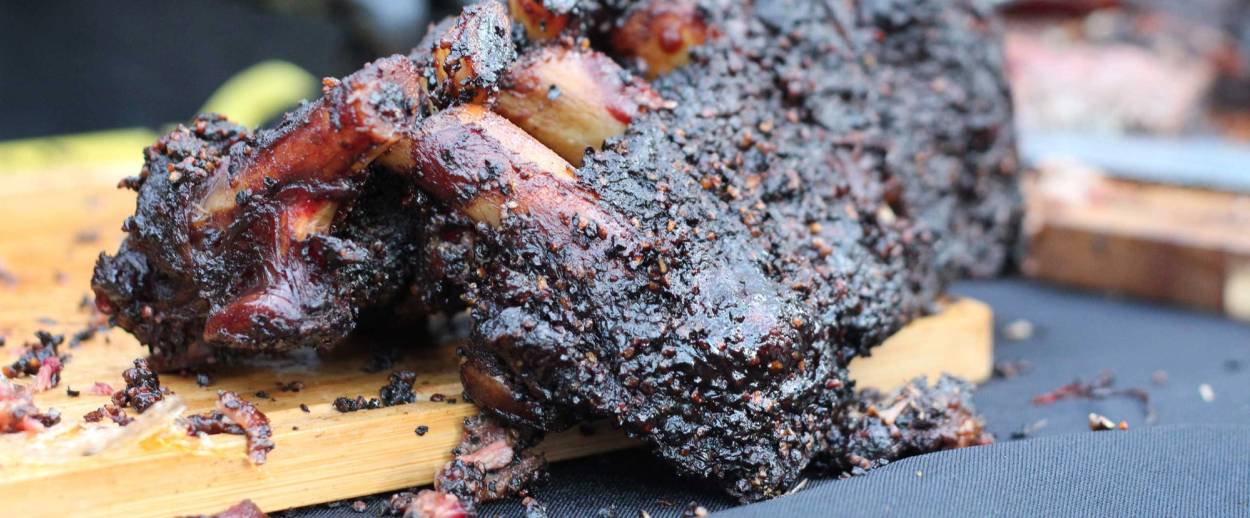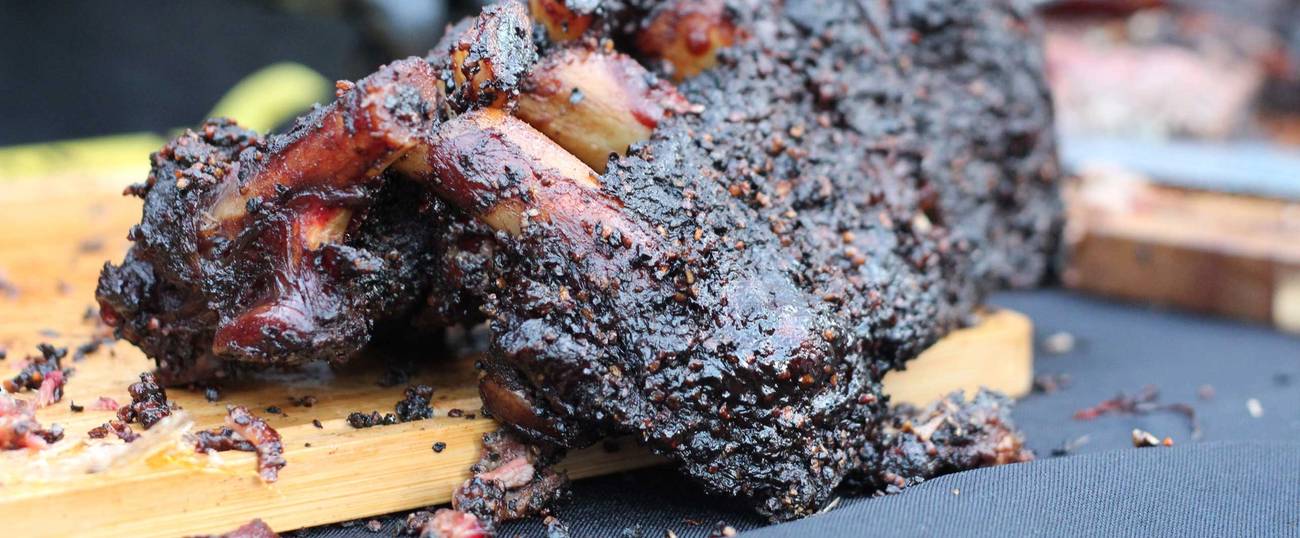Kosher Food Goes Up in Smoke
Barbecue is giving kosher food a new flavor—and vice versa




A kosher restaurant is bringing Texas barbecue to New York—by way of the Borscht Belt.
Main House, set to open this month, will serve up ribs with cornbread and peppery potato salad to diners in Mill Basin, Brooklyn. But its owners learned about barbecue years ago, miles away from the city.
Teddy Weiss, 35, one of four co-founders, said all their parents were from the former Soviet Union, and once they immigrated to the States, they’d spend summers in the Catskills—“Let’s call it the upstate New York version of Ukraine,” he joked. While other Jewish families might grill steaks by the pool or cook hot dogs and hamburgers, the owners took it much more seriously, spending hours smoking and slow-cooking their meat. When their neighbors would walk by and see an unfamiliar Weber Smokey Mountain Cooker, Weiss recalled, they’d ask: “That’s smoking—is something on fire?”
Fellow co-founder Richie Grin, 37, thinks their parents had something to do with the owners’ attraction to barbecue. Growing up relatively poor in Eastern Europe, he said, “they had no choice but to use meats that were affordable.” These typically weren’t prime cuts, so they had to be cooked for long periods of time. Just like Texas barbecue.
Grin explained what sets Texas barbecue apart: “A lot of it is more the in-depth science and the knowledge behind that, how meat breaks down, which is very different from throwing a steak on the grill, flipping it after two minutes, and it being ready,” he said. “This is more about being very patient with your meat, the low-and-slow attitude. That’s what really attracted us to the concept.”
But why make it kosher? “We all keep kosher,” said Weiss. Grin echoed him: “That wasn’t even a question for us.”
With chef Derick Polkoski at the helm, Main House is just one of several places putting a kosher stamp on Texas barbecue—in New York and beyond. Notable kosher barbecue outposts have cropped up everywhere from Kansas City (Mendel’s) to the heart of Texas itself: JoeBob’s BBQ in Austin. And annual contests are being held in Atlanta, Charlotte, Charleston, Dallas, Memphis, and San Antonio. These outlets aren’t just putting a new spin on barbecue; they’re changing the way kosher diners think about dinner.
***
Main House won’t be the only kosher barbecue spot in New York City. Sruli “Izzy” Eidelman, 29, the bearded Cross Fit fanatic behind Izzy’s Brooklyn Smokehouse in Crown Heights, Brooklyn, serves a mean brisket, although he’s come a long way since he started three years ago. “You know what he did to my house?” his Israeli mother, Sara Eidelman, exclaimed before launching into a tale of how her son ruined her new granite counters. Eidelman topped that with a yarn of his own, about the time his neighbors checked his house for a fire at 3 in the morning. At the sight of his smoker, one man phoned his colleague: “Guy’s smoking a brisket, we’re good.” They’d never seen a guy barbecuing in the winter before.
At Izzy’s, the brisket is tender, the sauce sticky and sweet. But Eidelman’s ingenuity is what sets his brisket apart. Holding a pulled-beef taco layered with zesty pico de gallo or a fried-chicken sandwich marinated in coconut milk, you get the impression Eidelman isn’t out to emulate Texas barbecue, but perhaps redefine it. “I just cook with whatever I like,” he said. “We’re not tied down to any region.”
In striking ways, kosher restrictions have pushed these barbecue restaurants to get more creative. Dairy is off-limits, which means no buttered biscuits or mac and cheese. However, Polkoski, for instance, has found tasty workarounds: making a stock from smoked chicken or turkey bones to flavor dishes, topping mashed potatoes with burgundy-glazed caramelized onions, lining a pan with chicken schmaltz for cornbread, or using brisket fat to saute onions.
Even the cuts of meat—tasty substitutes for pork like veal, lamb, and pastrami—reflect kosher barbecue’s distinctive approach. They also reflect the limitations placed on chefs when ordering meat. “I’ve sort of been at the mercy of the market,” said Ari White, the owner of Gemstone Catering and Wandering Que barbecue truck in New York City. (His snappy kosher sausages, including Cajun Andouille and Spicy Texas Hot Guts, hit stores March 7.) “In the meat business, period, you have only a couple of places to choose from … and then depending on whichever kosher organization people are under, that further narrows it down.” It also drives up the price. Employing a mashgiach to oversee preparations from Saturday night until Friday afternoon, when they close, is one thing; paying two or three times more than what a nonkosher restaurant would pay for back ribs is another.
The price point inevitably limits the audience, no matter how good the food is. Billy Durney, owner of Hometown Bar-B-Que, a nonkosher restaurant in Red Hook, Brooklyn, says there’s no way nonkosher diners would pay $20 for half a pound of smoked brisket at Izzy’s or Main House. Nonetheless, he said, “I think anybody who’s trying to do barbecue the true way—on all-wood fire—should be commended, regardless of whether it’s kosher or not. The only thing that qualifies legit barbecue to me is someone who: A. really, really cares; and B. cooks on wood.”
Both Izzy’s and Main House put a premium on service and ambiance, despite having to educate some folks about barbecue. “Brisket people are shocked how soft it is,” Eidelman said. “They’re used to having a piece of dried brisket that their grandmother probably cooked over the holiday, and they have this brisket that is really soft, tender, moist.”
Kosher diners are eager to try something new. “Everyone in this kosher world has had pizza, Chinese food, falafel, sushi,” said Grin, “but what they haven’t had are a lot of options for barbecue. We’re allowing, or introducing collectively with the other guys, a new cuisine.” He cites Pomegranate, a kosher supermarket in Midwood, Brooklyn, that could rival Whole Foods, and Top Chef alum Alex Reznik, who’s opened kosher restaurants in Queens and Los Angeles, as two examples of kosher food’s foray into foodie territory. “You’re now getting people who’ve always wanted to have new types of kosher food, and they’re gaining a level of respect from people who’ve been trained in the culinary world,” he said. “There’s this merging of worlds, where customers want different types of food, and there are people who are out there trying to give it to them. I think we’re just a part of that.”
***
Like this article? Sign up for our Daily Digest to get Tablet Magazine’s new content in your inbox each morning.
Jill Krasny is a writer from Texas.